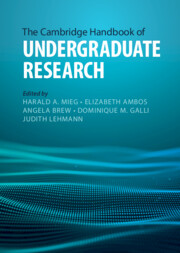Book contents
- The Cambridge Handbook of Undergraduate Research
- The Cambridge Handbook of Undergraduate Research
- Copyright page
- Contents
- Figures
- Tables
- Contributors
- Foreword
- Foreword
- 1 Introduction
- Part I Theory and Research on Undergraduate Research
- Part II Implementation, Approaches, Methods
- 7 Introduction
- Part II.1 Implementation Models in Undergraduate Research
- 8 The Zurich Framework
- 9 Four-Component Instructional Design Model, Maastricht
- 10 Connected Curriculum, UCL
- 11 Humboldt Reloaded, Hohenheim
- 12 The US Model at IUPUI
- Part II.2 Key Measures for the Implementation of Undergraduate Research
- Part III Disciplines
- Part IV International Perspective
- Part V Avenues for Developing Undergraduate Research
- Index
- References
8 - The Zurich Framework
from Part II.1 - Implementation Models in Undergraduate Research
Published online by Cambridge University Press: 11 August 2022
- The Cambridge Handbook of Undergraduate Research
- The Cambridge Handbook of Undergraduate Research
- Copyright page
- Contents
- Figures
- Tables
- Contributors
- Foreword
- Foreword
- 1 Introduction
- Part I Theory and Research on Undergraduate Research
- Part II Implementation, Approaches, Methods
- 7 Introduction
- Part II.1 Implementation Models in Undergraduate Research
- 8 The Zurich Framework
- 9 Four-Component Instructional Design Model, Maastricht
- 10 Connected Curriculum, UCL
- 11 Humboldt Reloaded, Hohenheim
- 12 The US Model at IUPUI
- Part II.2 Key Measures for the Implementation of Undergraduate Research
- Part III Disciplines
- Part IV International Perspective
- Part V Avenues for Developing Undergraduate Research
- Index
- References
Summary
The linking of teaching and research is a key element of the modern university. It requires curricular changes such as the redesign of courses and/or the integration of research-based student activities into the curriculum. In recent decades, various approaches to connect research to teaching and learning have been initiated. The Zurich Framework is a conceptual model for structuring research-oriented study programs that is much discussed in German-speaking countries. The Framework links teaching and research didactically on three levels: the level of single courses, the level of degree programs, and finally the institutional level. In particular, the framework includes a model for course-based undergraduate research.
Keywords
- Type
- Chapter
- Information
- The Cambridge Handbook of Undergraduate Research , pp. 93 - 100Publisher: Cambridge University PressPrint publication year: 2022

